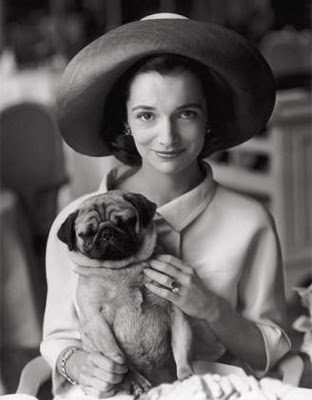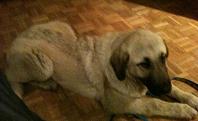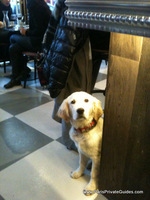 Our Concierge recently had an unusual request for travel planning assistance. To help a woman from California transport a rare breed of puppy from Toulouse to her home in San Francisco.
Our Concierge recently had an unusual request for travel planning assistance. To help a woman from California transport a rare breed of puppy from Toulouse to her home in San Francisco.
A reasonable request, but not so straightforward as first expected. Turns out there is a temporary embargo on shipments of unaccompanied animals from France to the USA. So David from our staff accompanied the dog from Paris to SFO.
In itself, this is not such an interesting story. However, once the dog had arrived in California, the family wanted some advice on naming their puppy. After all, a dog from France should have a French name – mais oui, bien sûr! (but, of course)
So like many of the articles here, it illustrates the remarkable idea that in France, a country with countless social rules and customs, there are actually rules about how to name your dog.
The custom, dating back to 1885, refers to the fact that for purebred dogs to be included in the official listing recording births (called the L.O.F. – Livres des Origines Francaises) they must be have a name that corresponds to the letter of the year they were born. The current sequence started in 1973 with the letter “I” and exludes the letters "K", "Q", "W", "X", "Y" and “Z” which are considered too difficult. So, every twenty years one returns to the same letter.
Apparently, this custom exists in many countries, including the US and Canada, where it is controlled by the AKC and CKC. However, the sequence of letters differs in each country. For example in Belgium, 2011 is a “K” year. Despite the prevalence of the idea, in France people seem to be much more aware and I noticed long ago that when someone mentions a new puppy, this invariably leads to a discussion where people try to figure out what letter it is this year. In fact, this very thing happened in the office when we were asked to help with a French name.
 For example, the puppy we helped “emigrate” to the US was born in 2010, a year corresponding to the letter “F.” His birth name was Fakir.
For example, the puppy we helped “emigrate” to the US was born in 2010, a year corresponding to the letter “F.” His birth name was Fakir.
If you have a new puppy and are looking for a French name, there are countless sites where you can get suggestions for male and female puppy names starting with the right letter.
Names starting with G for 2011:
Another site with more than 6,000 choices starting with all letters.
 If you are visiting Paris, don’t be surprised to see a dog under the table at a restaurant or café. There doesn’t seem to be any rules against it and even if there were, most rules in France were made to be broken. I have even seen dogs snoozing under chairs on stools in three-star Michelin restaurants. They are nearly always extremely well-behaved and only once did a small dog leave the comfort of his carry-bag to come over and beg for a treat from my plate.
If you are visiting Paris, don’t be surprised to see a dog under the table at a restaurant or café. There doesn’t seem to be any rules against it and even if there were, most rules in France were made to be broken. I have even seen dogs snoozing under chairs on stools in three-star Michelin restaurants. They are nearly always extremely well-behaved and only once did a small dog leave the comfort of his carry-bag to come over and beg for a treat from my plate.
One other canine anectdote is inspired by my friend J. A dog lover with a keen interest in the differences between French and English language he has long searched for an equivalent word in French for the game “Fetch.” The exhausting pastime for dog owners that never ceases to amuse the dogs themselves. In French, it turns out, there is no word for this game. It’s simply called “Throwing the ball for the dog.”
 Huh, here is yet another sign that the English language actually has a larger vocabulary than French. I’ve heard there is a difference of as much as 250,000 words in French to 400,000 in English. Of course, no self-respecting Frenchman (or woman) would ever agree to such a dramatic difference.
Huh, here is yet another sign that the English language actually has a larger vocabulary than French. I’ve heard there is a difference of as much as 250,000 words in French to 400,000 in English. Of course, no self-respecting Frenchman (or woman) would ever agree to such a dramatic difference.
So perhaps “Those French don’t actually have a different word for everything.”
If you would like help from the Paris Private Guides Concierge, click here.
Opening Photo: Princess Lee Radziwill with Thomas, her pug, by Henry Clarke, August 1960
Our Concierge recently had an unusual request for travel planning assistance. To help a woman from California transport a rare breed of puppy from Toulouse to her home in San Francisco.
We were able to accomplish this with little trouble, but it was no simple feat. Initially the idea was to send the dog unaccompanied on Air France, but there happens to be an embargo on such shipments from France to the USA. So someone from our staff accompanied the dog from Paris to San Francisco.
In itself, this is not such an interesting story. However, once the dog had arrived in California, the family wanted some advice on naming their puppy. After all, a dog from France should have a French name – mais oui, bien sûr! (but, of course)
So like many of the articles here, it illustrates the remarkable idea that in France, a country with countless social rules and customs, there are actually rules about how to name your dog.
The custom, dating back to 1885, refers to the fact that for purebred dogs to be included in the official listing recording births (called the L.O.F. – Livres des Origines Francaises) they must be have a name that corresponds to the letter of the year they were born. The current sequence started in 1973 with the letter “I” and exludes the letters "K", "Q", "W", "X", "Y" and “Z” which are considered to difficult. So, every twenty years one returns to the same letter.
Apparently, this custom exists in many countries, including the US and Canada, where it is controlled by the AKC and CKC. However, the sequence of letters differs in each country. For example in Belgium, 2011 is a “K” year. Despite the prevalence of the idea, in France people seem to be much more aware and I noticed long ago that when someone mentions a new puppy, this invariably leads to a discussion where people try to figure out what letter it is this year. In fact, this very thing happened in the office when we were asked to help with a French name.
For example, the puppy we helped “emigrate” to the US was born in 2010, a year corresponding to the letter “F.” So his birth name was Fakir. You can understand why the family wanted to change his name.
If you have a new puppy and are looking for a French name, there are countless sites where you can get suggestions for male and female puppy names starting with the right letter.
2011: http://ecoledeschiens.com/prenoms-chiens-2011.html
Another site with more than 6,000 choices: http://www.noms-de-chiens.com/
One last dog anecdote is inspired by my friend J. A dog lover with a keen interest in the differences between French and English language he has long searched for an equivalent word for the game “Fetch.” The exhausting pastime for dog owners that never ceases to amuse the dogs themselves.
In French, there is no word for this game. It’s simply called “Throwing the ball for the dog.” Huh, yet another sign that the English language has a larger vocabulary. I’ve heard there is a difference of as much as 250,000 words in French to 400,000 in English. Of course, no self-respecting Frenchman (or woman) would ever agree to such a dramatic difference. Perhaps “Those French don’t have a different word for everything.”